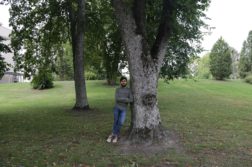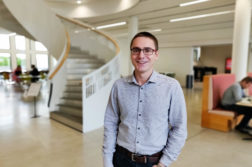Teamwork is a very common part of a modern career – for a reason. A wide range of expertise, various strengths, and diverse perspective are required to face the challenges of today and those of the future.
What make teamwork meaningful are the changes in the nature of work and information – where strong competence in a single sector was a kind of guarantee of a successful career, general career skills are becoming more and more important. In addition, technological development has sped up the process of how important it has become to create information with collaborative effort in today’s world.
Acquiring the amount of information needed to solve multi-disciplinary problems is a long process to undertake for one single person, but thanks to teamwork, it is possible to collect that knowledge and competence quickly.
On a journey of discovery, together
Working in a team is not just about creating information together, it’s also a journey. A sense of community and social skills are clearly a core part of teamwork; the networks and contacts that can emerge through it are often a contributor to possible futures.
Despite its social nature, working in a team can lead a student towards the themes of self-management and self-knowledge. Initiative, a systematic approach and responsibility for one’s own work are important to students, as team members and in their individual activities.
Holding different roles in a team can also serve to grow one’s own store of knowledge and create an understanding of one’s own strengths, through both peer feedback and self-reflection.
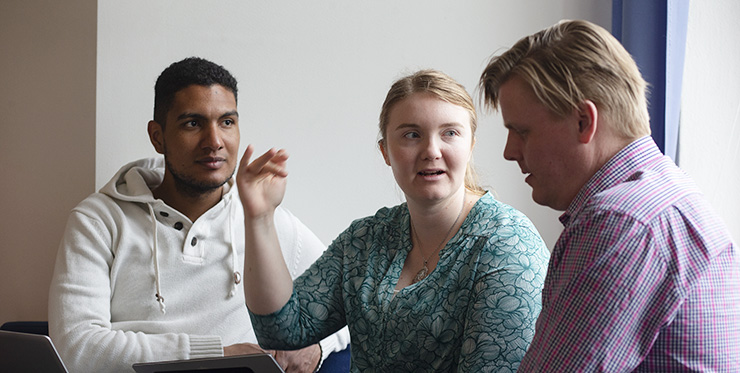
As clear a part of a modern career as teamwork is, now and in the future, it can be justified that it is also a way to work in your Bachelor’s degree studies. Our degree programmes include a large amount of teamwork, as it is a common practice in the ICT sector, and close cooperation with companies in the region is also at the core of our activities.
Project work and working together become a natural way to work from the start, giving the students capabilities for their future careers. Projects that promote learning, career knowledge and professional growth are sought in cooperation with the companies. Teamwork can also give rise to thesis topics as well as traineeships and jobs.
Creating a team and assigning roles
Teamwork begins as soon as the first module in the autumn. For a basis to create a team, each student is given the Belbin team role test, the results of which help teachers create teams that are as balanced as possible. This way, each team will have different personalities, of which, according to the Belbin test, there are nine.
Teams agree on common rules and come up with a team name. These teams will be together for all of autumn.
In the spring modules, the teams will be remade, first based on Belbin test results and then of the students’ own accord, as they will have gotten to know their fellow students and their strengths better over the first year. The second year begins with mixed teams from different programmes. After this, the second year of studies is spent working in engineering agencies, where they will work for the following three modules in their teams. At this point, the students know each other well enough that they can create long-term teams with no issue under their own leadership.
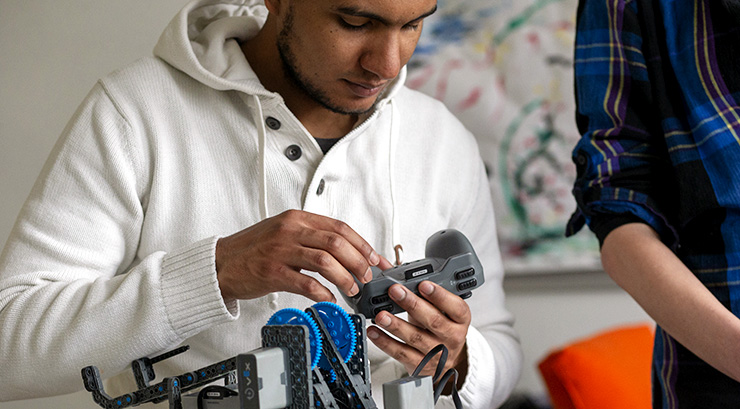
Cooperation benefits every participant in many ways. Everyone will naturally learn from each other, and above all, they will learn to work in larger groups and with various parties at once. Learning together will open new opportunities for all team members.
What is important for teamwork is good management, setting clear goals, open discussion and communication, bouncing ideas back and forth, sharing one’s own expertise and learning from others, working together, developing together, taking responsibility, and weekly monitoring. Teamwork is supported with the environments provided by Häme University of Applied Sciences, such as Microsoft Teams.
Teamwork involves thinking about things from a number of perspectives, which helps to create better solutions.
The project manager plays an important role. They assume responsibility for the project as a whole, distribute tasks, monitor progress, and naturally, take part in carrying out the project’s tasks. Regular meetings are necessary for confirming the operation’s direction. This way, each team member is kept up to date on the project and they are able to support others through their own expertise.
Each team member takes responsibility for their own area and shares their work openly. In addition, each team member must be ready to help others when necessary, and to adopt new roles. Teams work together, which creates good results and cross-learning opportunities.
As a rule, it is a good idea to rotate roles as projects change. This allows each student to try out the different roles in a safe environment, with their fellow students. This way, it is easier to find out the roles that you are better suited for, and what your strengths in a team are. You can also develop these strengths along the way. In addition to studies, projects and teamwork also help to develop one’s professional identity.
The teachers’ role in teamwork is, in addition to substance teaching, to support and guide the teams when necessary.
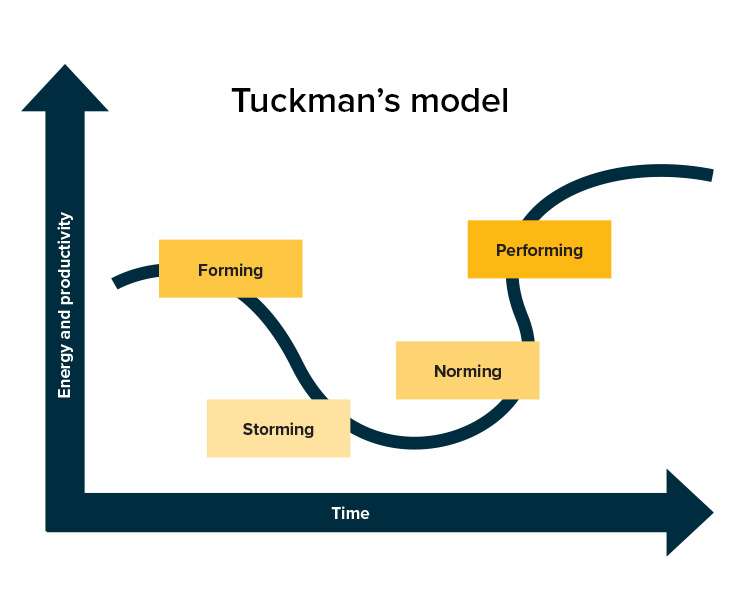
The phases of creating a team are forming, storming, norming, and performing, and avoiding crises in busy teamwork is certainly not possible. As learning experiences, problems are particularly valuable both for the team and its members’ professional growth. The instructor is responsible for making sure that any situation is solved through mutual dialogue. Despite its possible problems, teamwork as a whole is a highly empowering way to work.
Evaluation of teamwork
At HAMK, every degree has specific learning outcomes, which are what form the different modules’ learning outcomes. Evaluation of the modules is based on the module’s learning outcomes and assessment criteria. A module can consist of several parts of courses, which are all graded separately. Grades are either numerical (0–5) or a pass/fail. HAMK assessment guidelines state that the teacher(s) will give each student an individual grade even if the studies were carried out in a group or as project assignments.
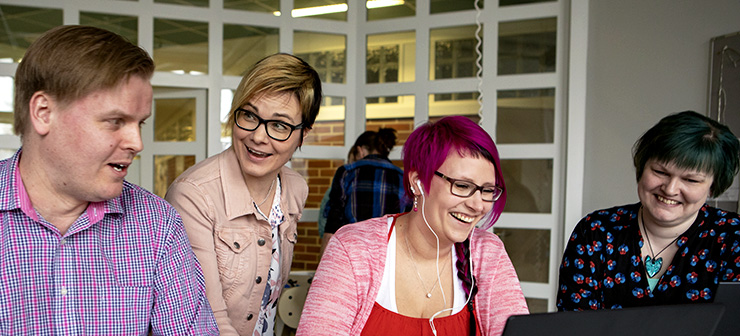
Studies are assessed in a versatile manner. Teachers do not only give grades at the end of each module, but will also observe the students throughout the module and, for example, consider how active the student is at intermediate checkpoints, project presentations, lectures, or in guidance situations. Feedback is given both verbally and in writing, and project client also provide feedback.
Teamwork is also a safe way to practice receiving feedback. In addition to teachers and clients, other team members can also give feedback. Positive feedback can increase self-esteem and give motivation to perform better. Receiving and understanding constructive feedback is an important skill, both during studies and at work, as well as in private life. To receive and give feedback is always an opportunity to learn and develop. Constructive feedback is not a reason to be insulted or turn inward, as feedback is what helps you develop both yourself and the joint activity, as well as to better support others.
At HAMK, we collect general feedback at the end of a module, and hold team feedback discussions. Students also carry out self-assessments and peer reviews, which contributes to the assessment as a whole. Team feedback discussions, held at the end of a module, are talks between the student and teacher teams. In these discussions, the focus is on processing how well the team works together, and they are used to review the team’s successes and its areas of development. Team feedback discussions often end in a round of praise, where team members get to give special thanks to every other member for their particular expertise or for taking responsibility.
These feedback discussions, for first-year students, are based on a team assessment form that the team members complete together. All students carry out a peer review on their team members, with a numerical grade and written feedback. Students also carry out a self-assessment process at the same time.
Teachers are able to assess the performance of each team member separately based on the responses, discussions and other observations. This way, they can give a fair grade to each team member, based on their own performance. Teamwork does not, therefore, automatically result in the same grade for every team member. In fact, it is a good idea to actively highlight one’s own competence and responsibilities in different situations and channels, so that the teachers do not miss anything that might later disappoint students at the end of the module.
To sum up, teamwork is an excellent learning environment where you can practice, stumble, and even fail in safety. Full-time and part-time students are advised to create their own teams, as their working hours are different. Guidance plays an important role, and more so in situations where there is an issue with the team. Teams are therefore encouraged to communicate with the instructors actively and regularly – even between weekly guidance sessions, if needed. Regular weekly meetings and memos help to structure activities, and instructors can also use them to monitor the situation. These different meetings, guidance events, operational environments and outputs create the overall picture, both for the team and its members individually.
Information and Communication Technology, Bioeconomy
HAMK Forssa Campus
Read more about the programme or visit our Facebook page.
More on teamwork:
The digital map of Elonkierto – a training module
Teamwork, Programming, Circular Economy, and Data Analysis – these are what Bioeconomy Engineers are made of
Tero Ahvenharju, Satu Alatalo, Ari Hietala, Anne-Mari Järvenpää and Johanna Salmia are in charge of the ICT Bioeconomy Engineering programme and have written this article as a team.



